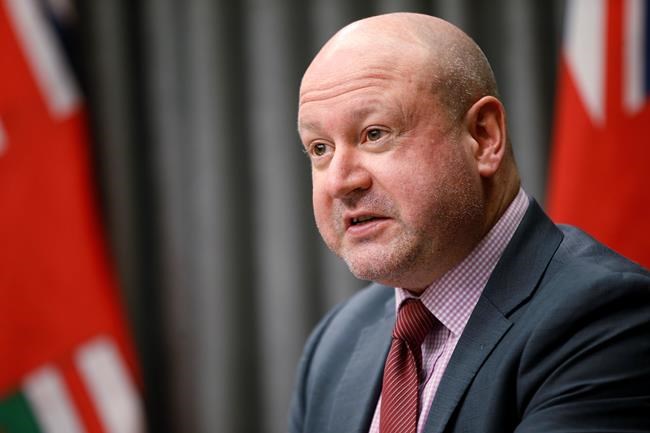Manitoba vaccine requirements likely to be in place until spring: top doctor
Advertisement
Read this article for free:
or
Already have an account? Log in here »
To continue reading, please subscribe:
Monthly Digital Subscription
$0 for the first 4 weeks*
- Enjoy unlimited reading on winnipegfreepress.com
- Read the E-Edition, our digital replica newspaper
- Access News Break, our award-winning app
- Play interactive puzzles
*No charge for 4 weeks then price increases to the regular rate of $19.00 plus GST every four weeks. Offer available to new and qualified returning subscribers only. Cancel any time.
Monthly Digital Subscription
$4.75/week*
- Enjoy unlimited reading on winnipegfreepress.com
- Read the E-Edition, our digital replica newspaper
- Access News Break, our award-winning app
- Play interactive puzzles
*Billed as $19 plus GST every four weeks. Cancel any time.
To continue reading, please subscribe:
Add Free Press access to your Brandon Sun subscription for only an additional
$1 for the first 4 weeks*
*Your next subscription payment will increase by $1.00 and you will be charged $16.99 plus GST for four weeks. After four weeks, your payment will increase to $23.99 plus GST every four weeks.
Read unlimited articles for free today:
or
Already have an account? Log in here »
Hey there, time traveller!
This article was published 18/10/2021 (1515 days ago), so information in it may no longer be current.
WINNIPEG – Manitoba’s COVID-19 vaccine mandate is likely to remain in place until at least the spring, chief public health officer Dr. Brent Roussin said Monday, so that the health-care system can handle both the ongoing pandemic and the traditional flu season.
“We review all these things all the time. But I think, given the state of our health-care system and the demands the respiratory virus season will be likely to put on it, it’s very likely we’ll have to take (the mandate) through this winter,” Roussin told reporters.
For several weeks now, Manitobans have had to show proof of immunization to enter a wide variety of venues, including restaurants, concert halls, theatres, fitness centres and large sporting events. Many front-line workers in health care, education and child care must also be vaccinated or undergo testing up to three times per week under workplace orders that took effect Monday.

Shared Health estimates it will impact about 42,000 workers and, as of Friday, 1,800 were identified as requiring testing.
“We have been planning for weeks now,” Health Minister Audrey Gordon said Monday.
Shared Health said in an email that there were no significant issues or service disruptions with implementation of the new rules. The department said 30 direct-care workers across the province refused rapid testing and were subsequently sent home as of Monday afternoon.
Roussin said there’s been no sign of virus transmission at big-crowd events that have recently been allowed again under the vaccination mandate, such as concerts and pro hockey games.
“There’s some complexity with linking up cases when you have that many people in an event, but (we) certainly haven’t seen any significant transmission there.”
The Winnipeg Chamber of Commerce was not surprised to hear the vaccine mandate is expected to remain in place for awhile. The group said the mandate has allowed many businesses to return to something approaching normal.
“Without a vaccine mandate, I think the overall sense was people may still be apprehensive to, say, go out and dine in a restaurant or go to an event,” chamber president Loren Remillard said.
“But with vaccine mandates, that has given consumers the confidence to know they can go into that place of business, knowing that everyone else in that business is fully vaccinated.”
Support for the vaccine requirement is not universal. There have been protests against Roussin’s public health orders and a small number of businesses have openly defied them, risking fines of up to $5,000 each time they are caught.
But Remillard points to a strong vaccine uptake — especially in Winnipeg, where 89 per cent of eligible people have at least one dose — as a sign that the public is largely onside.
The province reported 51 new COVID-19 cases Monday. Winnipeg accounted for nine of the cases and its five-day rate of people testing positive was 1.4 per cent — less than half the provincial average.
Elsewhere, the statistics were more troubling. More than half of the day’s new cases were in the southern health region, an area with about 15 per cent of Manitoba’s population and the lowest vaccine uptake.
In the north, an outbreak on the Norway House Cree Nation had First Nations leaders calling for more support.
“We require more resources and assistance from the two levels of government,” community leaders said in a written statement.
“Grateful as we are in receiving one or two nursing staff, we need a team that will come in to assist with the contact tracing and testing. Our teams are exhausted and burnt out.”
Overcrowded housing was contributing to the problem, they said, citing one household of 15 members that had 12 cases.
The province also announced it is expanding its list of those being recommended to get a third vaccine dose to include all First Nations people living on reserves.
Third doses have already been offered to nursing home residents, front-line health workers and immunocompromised individuals.
This report by The Canadian Press was first published Oct. 18, 2021.

